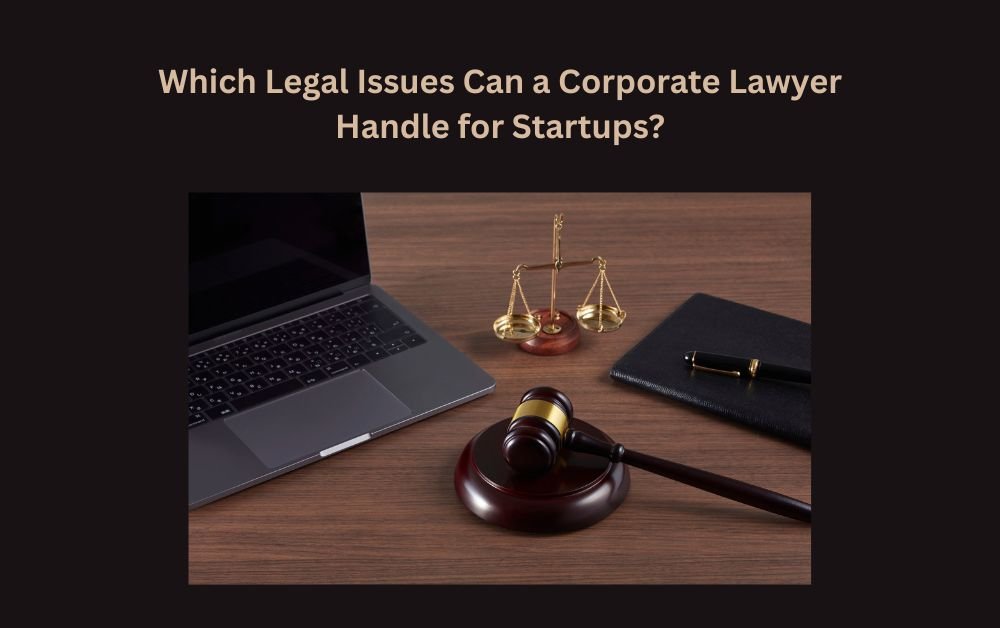Starting a new business is exciting. You may have a great idea, a clear vision, and the passion to make it successful. But along with excitement, startups also face many challenges. One of the biggest challenges is handling legal issues.
Many founders ignore legal matters in the beginning. They think legal problems can be solved later, once the company grows. But in reality, small mistakes in the legal setup can cause big troubles later. This is why startups often need the help of a corporate lawyer from the very start.
In this blog, we will explain in simple words the legal issues that a corporate lawyer can handle for startups. This guide will help you understand how legal support can protect your business and allow you to focus on growth.
Why Legal Support Is Important for Startups
Before we dive into specific issues, let us understand why a startup should care about legal support.
- Startups work in competitive markets. They must protect their ideas and assets.
- A single legal mistake can cost huge money, waste time, or even close down a business.
- Corporate lawyers bring experience. They know what problems usually happen with new businesses.
- Having a lawyer saves startups from making decisions that could harm them later.
In short, a lawyer is not just about solving disputes. A good corporate lawyer acts like a guide, showing startups the safe and legal way to move forward.
Note:- If you are starting a new business or already managing a growing startup, don’t wait until legal issues slow you down. Search for a trusted Corporate Lawyer Near Me today and get the right legal guidance to protect your company, secure your ideas, and build a strong future.

Major Legal Issues Handled by Corporate Lawyers for Startups
Let us now go step by step through the most common legal issues a startup faces. We will also see how a corporate lawyer can help with each of them.
1. Choosing the Right Business Structure
When you start a business, one of the first legal steps is to choose its structure.
What Are the Common Business Structures?
- Sole Proprietorship – A single person owns and runs the business.
- Partnership – Two or more people share ownership.
- Private Limited Company – A separate legal entity with shareholders and directors.
- Limited Liability Partnership (LLP) – A mix of partnership and limited liability features.
How a Corporate Lawyer Helps
- A lawyer explains the pros and cons of each structure.
- They help in registering the business legally with the government.
- They make sure the chosen structure matches the startup’s goals.
For example, if you want to attract investors, a private limited company may be better. A lawyer helps you decide without confusion.
2. Drafting Founder Agreements
Startups often have more than one founder. In the beginning, everyone is excited and trusts each other. But as the business grows, conflicts may happen.
Why Are Founder Agreements Important?
- They define each founder’s role and responsibility.
- They explain how much share each founder owns.
- They cover rules for what happens if a founder leaves.
- They prevent disputes and keep everyone on the same page.
Lawyer’s Role in Founder Agreements
A corporate lawyer drafts clear and fair founder agreements. They make sure the agreement covers:
- Ownership rights
- Voting powers
- Decision-making process
- Exit plans for founders
This agreement acts like a safety net for the business.
3. Protecting Intellectual Property (IP)
Startups usually rely on innovative ideas, unique products, or creative branding. Protecting these assets is very important.
Types of Intellectual Property
- Trademarks – Protect brand names, logos, or slogans.
- Copyrights – Protect creative works like designs, software, or content.
- Patents – Protect inventions and technical innovations.
- Trade Secrets – Protect confidential formulas, strategies, or processes.
Lawyer’s Role in IP Protection
- A corporate lawyer helps register trademarks, patents, and copyrights.
- They draft non-disclosure agreements (NDAs) to protect secrets.
- They take legal action if someone copies or misuses the startup’s ideas.
Without IP protection, competitors can easily copy your work. Lawyers ensure your hard work is safe.
4. Employment and HR Laws
As startups grow, they hire employees. This brings legal responsibilities.
What Legal Issues Can Arise with Employees?
- Drafting employment contracts
- Setting salary and benefits rules
- Handling workplace safety
- Following labor laws
- Preventing disputes between employer and employee
Lawyer’s Role in Employment Matters
- Corporate lawyers prepare employment contracts that are fair and legal.
- They guide on following minimum wage and working hour laws.
- They help create workplace policies for safety, harassment prevention, and employee rights.
This ensures smooth hiring and reduces chances of employee disputes.
5. Contracts with Clients, Vendors, and Partners
Startups need contracts with clients, suppliers, investors, and partners. Poorly written contracts can lead to misunderstandings.
Common Contract Issues
- Unclear payment terms
- No penalty for late delivery
- No rules for dispute resolution
- Contracts not following the law
Lawyer’s Role in Drafting Contracts
- Corporate lawyers draft strong contracts.
- They review contracts given by others to protect the startup.
- They add clauses that safeguard the startup’s interests.
A good contract avoids future arguments and keeps business relations strong.
6. Compliance with Business Laws
Every country has laws for businesses. Startups must follow them to avoid fines.
Examples of Compliance
- Registering for taxes like GST or VAT
- Filing annual company returns
- Following data protection and privacy rules
- Meeting environmental and safety standards
How a Lawyer Helps in Compliance
- Lawyers keep startups updated on legal requirements.
- They prepare documents and filings on time.
- They prevent costly penalties from missing compliance.
Compliance may look boring, but it is crucial for a safe business journey.
7. Fundraising and Investor Agreements
One of the main goals of startups is to attract investment. But raising money also involves legal steps.
Issues in Fundraising
- Ownership dilution (founders losing too many shares)
- Rights of investors vs rights of founders
- Clear exit options for investors
- Misunderstandings about use of funds
Lawyer’s Role in Fundraising
- Drafting shareholder agreements
- Ensuring compliance with securities laws
- Explaining investor rights and founder rights
- Protecting the founders from losing control
Lawyers make sure funding deals are fair and legally safe.
8. Resolving Disputes
Even with the best planning, disputes can happen. These may be with employees, partners, or clients.
Common Types of Disputes
- Payment delays from clients
- Contract violations
- Founder disagreements
- Employee claims
Lawyer’s Role in Dispute Resolution
- A corporate lawyer first tries to solve disputes peacefully through negotiation.
- If needed, they guide startups through arbitration or court cases.
- They aim to save time and money while protecting the startup’s reputation.
9. Exit Strategies and Business Closure
Not all startups succeed. Sometimes, founders may want to sell the business, merge with another company, or close it.
Exit Options
- Merger or Acquisition – Another company buys the startup.
- Selling Shares – Founders sell their ownership to others.
- Shutting Down – Closing the business legally.
Lawyer’s Role in Exit Strategies
- Corporate lawyers draft sale agreements.
- They ensure taxes and debts are cleared before closing.
- They protect the founders from future liabilities.
This helps startups exit smoothly without legal headaches.
Why Startups Should Work with Corporate Lawyers from Day One
Many startups wait until they face a problem before calling a lawyer. But this is a mistake. Having a corporate lawyer from the beginning offers many benefits:
- Prevents costly mistakes early on
- Builds strong legal foundations for growth
- Gives confidence to investors and partners
- Saves time for founders to focus on the business
A lawyer is like an insurance policy – you may not think you need it every day, but it saves you when something goes wrong.
Conclusion
Building a startup is like building a house. If the foundation is weak, the house may collapse. A corporate lawyer helps build a strong foundation by handling all legal matters.
From choosing the right business structure, protecting intellectual property, drafting agreements, ensuring compliance, to solving disputes – a corporate lawyer is the guiding hand every startup needs.
If you are starting a new business or already running one, do not ignore the legal side. Work with a trusted corporate lawyer who understands startups. This way, you can focus on your dream while knowing that the legal safety net is always there to protect you.
For more insightful articles related to this topic, feel free to visit bizz2fone.com
